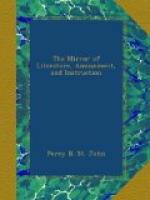The Original Strand.—In the reign of Edward III. the Strand was an open highway. A solitary house occasionally occurred; but in 1353, the ruggedness of the highway was such, that Edward appointed a tax on wool, leather, &c. for its improvement.
On the laying the first stone of the church of St. Martin’s in the Fields, the king (George I.) gave one hundred guineas to be distributed among the workmen.
A swampy Kingdom.—In the reign of Charles II. at the east end of St. James’s Park, there was a swampy retreat for the ducks, thence denominated Duck Island, which, by Charles was erected into a government, and a salary annexed to the office, in favour of the celebrated French writer, M. de St. Evremond, who was the first and last governor.
The gold embroidery of the chair of state in Carlton Palace is stated to have cost 500_l_.
The horse rode by the Champion in the coronation of George the Third was the same that bore George the Second at the memorable battle of Dettingen.
Political Criticism.—The following proof of political prejudice may not be known:—“John Milton was one whose natural parts might deservedly give him a place amongst the principal of our English poets, having written two heroic poems and a tragedy, viz:—Paradise Lost, Paradise Regained, and Samson Agonistes; but his fame is gone out like a candle in a snuff; and his memory will always stink, which might have ever lived in honourable repute, had he not been a notorious traitor, and most impiously and villanously belied that blessed martyr, King Charles I.”—Lives of the most famous English Poets, &c. 1687, by Wm. Winstanley.
A Pastor.—The Rev. Andrew Marvell, A.M. father of the patriot, was born at Mildred, in Cambridgeshire, in 1586. He was a student of Emanuel College in that University, where he took his degree of Master of Arts in 1608. Afterwards he was elected master of the grammar school at Hull, and in 1624, lecturer of Trinity Church in that town. “He was a most excellent preacher,” says Fuller, “who, like a good husband, never broached what he had new-brewed, but preached what he had studied some competent time before: insomuch that he was wont to say that he would cross the common proverb, which called ’Saturday the working day, and Monday the holiday, of preachers.’”
Dryden’s Mc Flecnoe.—W. Newcastle has the following excellent lines in reference to Dryden’s poem:—
“Flecnoe, thy characters are so full of wit And fancy, as each word is throng’d with it. Each line’s a volume, and who reads would swear Whole libraries were in each character. Nor arrows in a quiver stuck, nor yet Lights in the starry skies are thicker set, Nor quills upon the armed porcupine, Than wit and fancy in this work of thine.”




